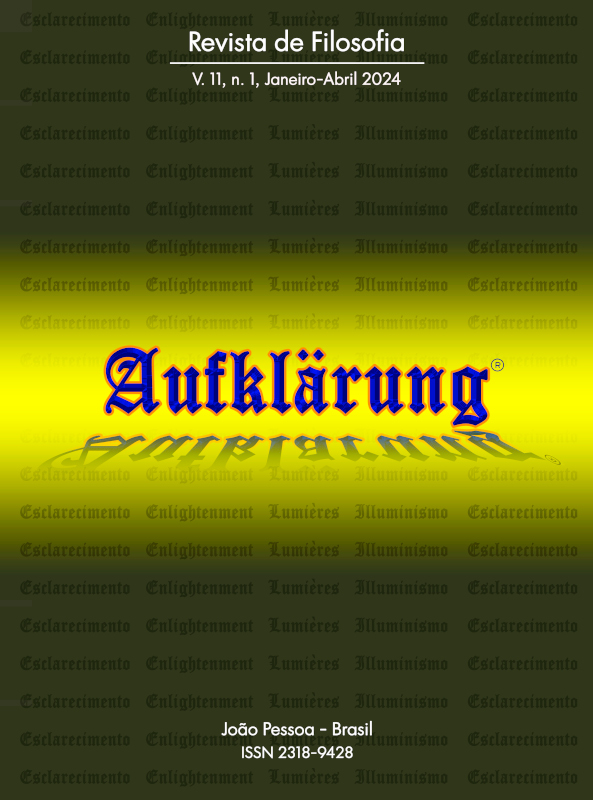Nietzsche and the directions for a tragic theory of scientific knowledge
DOI:
https://doi.org/10.18012/arf.v11i1.65740Keywords:
Science, Ascetic ideal, Tragic knowledge, Life, TruthAbstract
The purpose of this article is to point out five aspects of Nietzschean thought that may be relevant to debates in the philosophy of science around the nature and representation of scientific knowledge. To this end, a literature review is carried out with the aim of selecting excerpts from Nietzschean works such as The Birth of Tragedy, Genealogy of Morals, The Gay Science and others that allow us to interpret Nietzsche as a philosopher of science concerned with the construction of scientific knowledge about the physical reality. As a result, it is possible to identify an epistemological proposal in the Nietzschean perspective, whose objective representation of the world should point to an aesthetics of life.
Downloads
References
BEHE, M. The modern intelligent design hypothesis: breaking rules. In: MANSON, N. A. (ed.). God and design: the teleological argument and modern science. Londres: Routledge, 2003. p. 277-290.
CAMILO, B. Da verdade ao perspectivismo: uma abordagem nietzschiana aplicada à filosofia da ciência. Lampejo: revista eletrônica de filosofia e cultura, Fortaleza, v. 9, n. 1, p. 468-485, 1º semestre 2020. Disponível em: http://revistalampejo.apoenafilosofia.org/?page_id=1714. Acesso em: 22 jul. 2022.
CAMILO, B. O problema do cientificismo. 2018. Tese (Doutorado em filosofia) – Programa de Pós-graduação em Filosofia, Universidade Federal do Ceará, Fortaleza, 2018. Disponível em: http://www.repositorio.ufc.br/handle/riufc/39432. Acesso em: 24 maio 2022.
COSTA, A. L. F. Nietzsche e a relação entre arte, ciência e filosofia dos escritos de juventude até Humano demasiado humano. Cad. Nietzsche, Guarulhos/Porto Seguro, v. 42, n. 3, p. 89-113, set./dez. 2021. Disponível em: https://doi.org/10.1590/2316-82422021v4203alfc. Acesso em: 22 jul. 2022.
DEMBSKI, W. A.; KUSHINER, J. M. (ed.). Signs of intelligence: understanding intelligent design. Grand Rapids: Brazos Press, 2011.
FEYERABEND, P. K. Contra o método. 2. ed. São Paulo: Editora Unesp, 2011.
FINK, E. A Nietzsche’s philosophy. London: Continuum, 2003. (Athlone contemporary european thinkers).
FREZZATTI JR, W. A. Nietzsche e a ciência: um ensaio sob a perspectiva da relação entre ciência, metafísica e arte. Estudos Nietzsche, Espírito Santo, v. 9, n. 2, p. 102-115, jul./dez. 2017. Disponível em: https://periodicos.ufes.br/estudosnietzsche/article/view/18451. Acesso em: 28 maio 2022.
HUTCHINSON, I. H. Monopolizing knowledge: a scientist refutes religion-denying, reason-destroying scientism. Belmont: Fias Publishing, 2011.
KIDD, I. J. Is scientism epistemically vicious? In: RIDDER, J. et al. (ed.). Scientism: prospects and problems. Oxford: Oxford University Press, 2018, p. 149-166.
KUHN, T. S. A estrutura das revoluções científicas. São Paulo: Perspectiva, 2013. (Debates; 115).
MEDRADO, A. Ciência como continuação da arte em Humano, demasiado humano. Cadernos Nietzche, São Paulo, n. 29, p. 293-308, 2011. Disponível em: https://periodicos.unifesp.br/index.php/cniet/article/view/7758. Acesso em: 22 jul. 2022.
NIETZSCHE, F. W. A filosofia na época trágica dos gregos (1873). In: LEBRUN, G. (ed.). Friedrich Nietzsche: obras incompletas. São Paulo: Nova Cultural, 1999a. p. 251-266. (Os pensadores; v. 32).
NIETZSCHE, F. W. A gaia ciência. São Paulo: Martin Claret, 2016.
NIETZSCHE, F. W. Além do bem e do mal: prelúdio a uma filosofia do futuro. 2. ed. 10. reimp. São Paulo: Companhia das Letras, 1992.
NIETZSCHE, F. W. Genealogia da moral: uma polêmica. São Paulo: Companhia das letras, 1998.
NIETZSCHE, F. W. Humano, demasiado humano: um livro para espíritos livres. São Paulo: Lafonte, 2018.
NIETZSCHE, F. W. O anticristo: maldição ao cristianismo. Ditirambos de Dionísio. São Paulo: Companhia das Letras, 2012.
NIETZSCHE, F. W. O nascimento da tragédia ou helenismo e pessimismo. 2. reimp. São Paulo: Companhia das letras, 1996.
NIETZSCHE, F. W. Sobre verdade e mentira no sentido extra-moral. In: LEBRUN, G. (ed.). Friedrich Nietzsche: obras incompletas. São Paulo: Nova Cultural, 1999b. p. 51-60. (Os pensadores; v. 32).
PLATÃO. Fédon. 3. ed. Belém: Ed. UFPA, 2011.
POPPER, K. R. A lógica da pesquisa científica. 2. ed. São Paulo: Cultrix, 2013.
ROSENBERG, A. Philosophical challenges for scientism (and how to meet them?). In: RIDDER, J. et al. (ed.). Scientism: problems and prospects. Oxford: Oxford University Press, 2018. p. 83-105.
ROSENBERG, A. The atheist's guide to reality: enjoying life without illusions. Nova York: W. W. Norton & Company, 2011.
ROSS, D.; LADYMAN, J.; SPURRETT, D. In defense of scientism. In: LADYMAN, J.; ROSS, D.; SPURRETT, D.; COLLIER, J. Every thing must go: metaphysics naturalized. Oxford: Oxford, University Press, 2007. p. 1-65.
SCHOPENHAUER, A. O mundo como vontade e representação. São Paulo: UNESP, 2005.
WILLIAMS, R. Cultura e materialismo. São Paulo: Editora Unesp, 2011
Additional Files
Published
How to Cite
Issue
Section
License

This work is licensed under a Creative Commons Attribution 4.0 International License.
Journal general policy
1.This journal works under a Creative Commons License aplied to online journals. That icence can be read in the following link: Creative Commons Attribution 4.0 International (CC BY 4.0).
2.Accordingly to this License, a)the journal declares that authors hold the copyright of their articles without restrictions, and they can archieve them as post-print elsewhere. b)the journal allow the author(s) to retain publishing rights without restrictions.
Metadata Policy for information describing items in the repository
1. Anyone may access the metadata free of charge at anytime.
2.The metadata may be re-used in any medium without prior permission, even commercial purposes provided the OAI Identifier or a link to the original metadata record are given, under the terms of a CC BY license refered for the Journal.







































